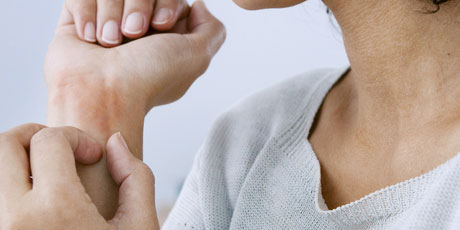Information for right diagnosis | Personal health history | Food habits | Possible triggers | Diagnostic tests | Ruling out similar conditions
Your GP will conduct a physical examination and examine the area where rash occurs. He will ask various details and your medical history to fix the trigger that had caused the urticaria. Many a time, it is very difficult to pin point the exact cause. He will check if you are pregnant. He may refer you to an allergy clinic and a dermatologist as needed.
Information for right diagnosis
- Urticaria onset time and where it started.
- Environment – details about your home, workplace, job details, any exposure to industrial chemicals and other details.
- Are there any pets, animals around you?
- Any recent travel and where?
- Any allergic complaints in your family?
- Enquiry for food, food additives, drugs and infection?
- Family history of any thyroid or autoimmune diseases?
- History of any dental problem?
Examination – Morphology and distribution of the rash, rule out systemic involvement like fever or swelling of lips tongue and clinical evidence of any infection like dental infection or vaginal infection most commonly.
Personal health history
- Any recent health complaint/illness like
- Diarrhea, nausea.
- Cough, sore throat, cold/runny nose.
- Any systemic disease like
- Diabetes.
- Liver disease.
- Kidney problems.
- Lupus.
- Drugs/medications (both prescribed and over the counter) you take regularly (Even those now not taking.)
- Any new medications started?
- Supplements, herbs?
Food habits
- What did you eat just prior to the attack?
- Your normal diet? Any recent addition?
- Any prior adverse reaction to any food item?
Possible triggers
- Any change in the routine – like exposure to sun, cold, heat etc; contact with latex, rubber nickel etc ?
- Anything new added recently – Cosmetics, hair dyes, domestic cleaners/detergents?
Diagnostic tests
For acute urticaria, no diagnostic tests may be needed. For recurrent type chronic urticaria, your doctor will order
- Blood and urinalysis for identifying anemia.
- Liver function tests to rule out any liver connected problems.
- Erythrocyte sedimentation rate for checking on immune system.
- Thyroid functions tests for hypo/hyperthyroid conditions.
- ANA (antinuclear antibody) test.
- A stool sample for identifying intestinal parasites.
In case of protracted presence of severe rash, a punch biopsy is taken.
Ruling out similar conditions
Your GP will rule out a range of other dermatologic conditions that can present similar symptoms like
- Eczema.
- Contact dermatitis.
- Insect bites.
- Erythema multiforme.
- Pityriasis rosea.
Angioedema can be like hives with larger welts forming in the deeper layers of the skin and will need medical attention promptly if wheals form inside the throat.
Outcome
The treatment is aimed at finding out the triggers and avoiding them. Keeping a food diary will be recommended by the doctor. For frequent outbreaks of urticaria, the doctor may recommend a course of antihistamine.


 Dr. Batul Patel is a celebrity dermatologist and the medical director of The Bombay Skin Clinic an award winning clinic located in South Mumbai & Bandra. She is a passionate and dedicated dermatologist with expertise in all fields of dermatology, trichology and aesthetic dermatology. She has been practicing for more than a decade. Her range of expertise include emsculpt NEO, coolsculpting, fillers, acne treatment, lasers, skin rejuvenation, hair loss, hair transplant, PRP & pigmentation treatments.
Dr. Batul Patel is a celebrity dermatologist and the medical director of The Bombay Skin Clinic an award winning clinic located in South Mumbai & Bandra. She is a passionate and dedicated dermatologist with expertise in all fields of dermatology, trichology and aesthetic dermatology. She has been practicing for more than a decade. Her range of expertise include emsculpt NEO, coolsculpting, fillers, acne treatment, lasers, skin rejuvenation, hair loss, hair transplant, PRP & pigmentation treatments.